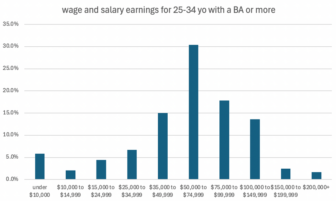Two important editorials highlight how far off track too many state policy makers are when it comes to education policy. And that the consequence of bad policy is harmful not just to Michigan kids (what matters most) but also to employers and the economy. Both are must reads!
The Detroit News in an editorial entitled Michigan kids deserve a strong educational foundation: Weakening state curriculum would make Michigan students less competitive makes the case against lowering high school graduation requirements. Adoption of those standards seven years ago was one of the signature accomplishments of the Granholm years. They passed with broad bi-partisan and business community support. They represent a major step in educating all Michigan kids for the economy they are going to live in rather than the one their parents and grandparents lived in which is in irreversible decline.
That is now under attack in the legislature where bi-partisan legislation is under serious consideration to roll back the standards in favor of reemphasizing vocational training. Not smart! As the News writes:
The Grand Rapids Business Journal in an editorial written by Carol Valade –– Gemini Publications’ editor –– entitled Current education policy creates another generation unfit for jobs makes a powerful case that preparing college students for specific occupations that policy makers believe are in high demand is not good for either students or employers. Valade writes:
What matters most is that Snyder (and politicians everywhere) is attempting to set long-term public policy, believing that the government can solve the problems of business and force colleges and universities deplete their dwindling state revenues to pump up student levels and programs the politicians believe are necessary to fill the “skills gap.” It is especially embarrassing — and inexplicable — to see Snyder, especially given his business background, walk this state into such an abyss. … But the bottom line is that no one knows — especially not politicians — what skill sets will be needed next. Such is often the theme of columnist Thomas Friedman, who cites “the curiosity quotient” as being more important than IQ in a “world guaranteed to change in unpredictable ways” and the continuing suddenness of such change as has been witnessed for more than 10 years.






